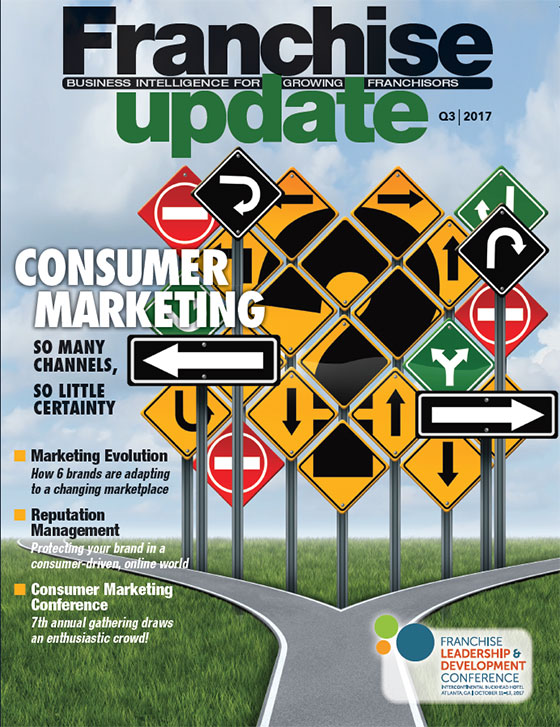Keeping It Real: Building Trust Through Authenticity

Webster's dictionary describes the word "authentic" as genuine, actual, bona fide. Simply put, authentic marketing means "information buyers can trust." Trustworthy information influences decision-making and inspires action.
More than 2,300 years ago in Greece, Aristotle taught extensively about persuasive communication. His techniques are so timeless and effective that they are still being taught to law and philosophy students today. Additionally, his teachings are highly relevant to franchise opportunity content creation such as websites, blogs, and lead nurturing.
Aristotle asserted that all persuasive communication contains three key elements. All three relate to franchise opportunity marketing today.
- Ethos. The information source must be perceived as credible. Take the name, "Aristotle" for instance. It's a "smart name." It has instant "street cred." Would you be as interested if we discussed "Billy Bob's cognitive model for influencing behavior?" Although your website is expected to be biased, the writer's voice should indicate "high belief" and "objective bias." You should eliminate unsubstantiated superlatives such as "This is the best franchise in our industry." Says who? By what measure?
- Pathos. The information must strike an emotional nerve, like a passion or a felt need. Franchisees invest in senior care, sports, fitness, and educational franchises to "make money by making a difference." They can relate to the brand purpose on a deep emotional level.
- Logos. This is an appeal to logic. When we design franchise opportunity websites, we make a strong business case using data and rationales describing what makes the business unique, profitable, sustainable for the long haul, and necessary to the customer.
Selling in the online era
Harvard Business School faculty member Frank Cespedes and automobile marketing and technology thought leader Jared Hamilton penned an article in the Harvard Business Review titled "Selling to Customers Who Do Their Homework Online" (March 16, 2016). They pointed out how self-directed research is altering the car buying process. Cespedes and Hamilton discovered that the average car buyer spends 14.5 hours on the auto buying process, with more than 75 percent (11 hours) spent online and most of their research conducted up front.
Franchisors need to develop a talent for creating online content streams that appeal to ethos, pathos, and logos, successfully addressing candidates' questions and concerns. Franchise buyers are starved for content and information they can trust, which tells them the good and the bad and carefully manages expectations about what it takes to win as a franchisee. Franchisors have traditionally been stingy or inauthentic, driving buyers off their site and searching for robust and transparent content streams they can trust.
Shooting straight
Many years ago, I studied influence with Robert Cialdini, who wrote the marketing classic Influence, which outlines his principles of persuasion. I remember him saying, "Always lead with the negatives." Let's assume we are discussing a franchise with the best unit-level economics in a particular category. Cialdini would ask you to rate which of the two statements appears more credible to the buyer.
- "We are the fastest-growing and best money-making franchise in the category."
- "Our franchisees work very hard. This business is not right for everyone. But for the right person, they will find we are the best money-making franchise in the category."
If franchisors shoot straight and populate their website with trustworthy information, candidates will reward the franchisor's transparency with their investment dollars. Recently, I was sitting in a discovery day and a candidate was explaining to the executive team and other franchise candidates why he was there. The candidate said, "I loved the corporate culture, look and feel of the store, customer feedback, unit-level economics, and the overall leadership philosophy and website. I could see the fit." The CEO asked, "How do you know all this?" The candidate responded, "It was all up on your website."
Cespedes and Hamilton found that nearly 40 percent of auto buyers won't do business with a dealer whose website doesn't list vehicle prices. An even higher percentage will leave a car lot if prices aren't clearly posted on the vehicles. In other words, the tactic of "hold back information and make them talk to you" breaks down trust and ends communication. Holding back information is a conversation stopper, not a starter.
But where do you draw the line? When does content stop and conversation begin? The short answer is "nobody knows." The buying process is transforming. However, I believe you design systems that anticipate where behavior is going rather than where it has been. If you are going to err (and you are), then err on the side of being overly transparent and overly generous with authentic information. What's the downside?
Joe Mathews is CEO of Franchise Performance Group, specializing in growth strategies, franchise candidate recruitment, lead generation, and financing. He is the author of four books on franchising: Street Smart Franchising, Franchise Sales Tipping Point, Developing Peak Performing Franchisees, and How To Create a Franchise Sales Breakthrough. Guaranteed. Contact him at 860-309-1484 or [email protected].
Share this Feature
Recommended Reading:
FRANCHISE TOPICS
- Multi-Unit Franchising
- Get Started in Franchising
- Franchise Growth
- Franchise Operations
- Open New Units
- Franchise Leadership
- Franchise Marketing
- Technology
- Franchise Law
- Franchise Awards
- Franchise Rankings
- Franchise Trends
- Franchise Development
- Featured Franchise Stories
FEATURED IN

Franchise Update Magazine: Issue 3, 2017








 The franchise listed above are not related to or endorsed by Franchise Update or Franchise Update Media Group. We are not engaged in, supporting, or endorsing any specific franchise, business opportunity, company or individual. No statement in this site is to be construed as a recommendation. We encourage prospective franchise buyers to perform extensive due diligence when considering a franchise opportunity.
The franchise listed above are not related to or endorsed by Franchise Update or Franchise Update Media Group. We are not engaged in, supporting, or endorsing any specific franchise, business opportunity, company or individual. No statement in this site is to be construed as a recommendation. We encourage prospective franchise buyers to perform extensive due diligence when considering a franchise opportunity.